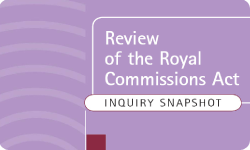Royal Commissions, ensuring independence
 Georgia King-Siem
Georgia King-Siem
In January 2009, the Attorney-General announced that the Australian Law Reform Commission (ALRC) would review the operation and provisions of the Royal Commissions Act 1902 (Cth). The ambit of the inquiry extends to all federal government ad hoc non-judicial non-executive public inquiries.
In particular, the ALRC is to consider:
- Whether there should be special provisions and powers for inquiries involving national security;
- The appropriate balance between powers exercised by inquiries and those subject to those powers;
- Restrictions on the use and disclosure of information obtained by inquiries;
- Any other suggested changes to the Act.
The ALRC released its Issues Paper (IP 35) in early April 2009, which detailed the history and powers of Royal Commissions and other ad hoc non-judicial non-executive public inquiries. Liberty noted that independent and transparent (i.e. public) inquiries are critical to good government. Ideally these types of inquiries would all fall under one piece of legislation — in a similar fashion to the Canadian and New Zealand models.
Inquiries may fall into different categories with corresponding powers and protections, although care needs to be taken to ensure inquiries have sufficient powers and protections to achieve their purposes. In light of the powers wielded by inquiries, it is important that the Commissioner(s) heading them be demonstrably independent and appropriately qualified for the task.
Finally, Liberty believes it is essential that the reports of inquiries be tabled in Parliament to the greatest extent possible. A full copy of Liberty’s submission will be available on the ALRC website in the coming weeks.
In addition to accepting written submissions, the ALRC is also consulting with relevant and interested bodies, such as Liberty Victoria. In fact, even before receiving Liberty’s written submission, the ALRC advised it would be interested in meeting the Liberty to discuss our views on this inquiry.
Accordingly, Liberty provided its written submission the week before its consultation with the ALRC on 11 May. The consultation was used to expand on Liberty’s views and explore practical examples of how reform in this area could be achieved.
Although submissions closed on 19 May, the ALRC will release a Discussion Paper and invite further comment before making its final report to Government in October 2009. I urge anyone interested in this topic to contact Liberty or go to the ALRC website (www.alrc.gov.au) to find out more. Liberty would also like to thank one of our volunteers, Rhys Michie, for his assistance.
Georgia King-Siem is a Vice-President of Liberty Victoria.
